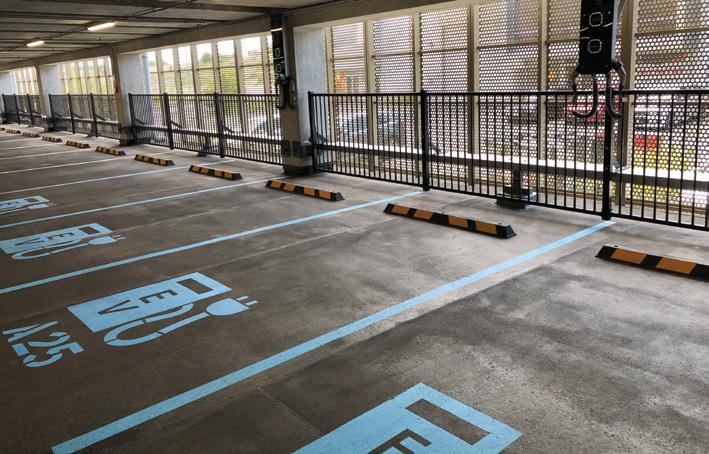
6 minute read
In Brief
from FYI March 2021
FED. appointed as supplier to Ka Ora, Ka Ako healthy school lunches programme
The team at FED. is celebrating its selection as a supplier to the Ministry of Education’s Ka Ora, Ka Ako healthy school lunches programme.
The contract started at the beginning of the first school term in 2021, when the meal delivery business began supplying nine schools in the Māngere-Ōtāhuhu West District, serving a total of 3,200 children daily.
Founded in 2018 and based in Airborne Road, FED. makes nutritious, ready-to-eat meals prepared by chefs and delivers them to Kiwi homes across the North Island. It began a school meal lunch service to a selection of Auckland schools in 2019.
FED co-owners David Pilley, Beckie Pilley, Becky Erwood
“This is a significant and important project to be a part of and we are honoured to be invited on the journey,” said FED. co-founder Becky Erwood. “With so many New Zealand children living with food insecurity, we wholeheartedly support the mission to ensure students are sufficiently nourished during the school day.” “From our initial discussions with schools, we understand what a significant issue this is for them. We know that when children are not hungry, they are better able to learn. We also believe in supporting teachers so they can focus on their main role, teaching our tamariki without taking on the extra responsibility of feeding students.”
Find out more about Ka Ora, Ka Ako at education.govt.nz/free-and-healthy school-lunches
Introducing PeopleMaps to Kiwi businesses
PeopleMaps psychometric testing is available in New Zealand for the first time. Thousands of organisations in other parts of the world already have a PeopleMaps account, and more than 1.5 million business people have completed the PeopleMaps questionnaire. And now, Business North Harbour member, Chris Baker of Onwards and Upwards, is pioneering the system here.
“The understanding of self and others is at the very foundation of all relationships and communication. Unfortunately, most people have a low awareness of both their own personality and that of others, and how that affects their day-to-day professional and personal life,” says Chris, who was a business coach and mentor for nearly 20 years.
Explaining why he felt there was a gap in the New Zealand market for PeopleMaps, Chris says he was impressed not only with the system’s efficacy, but also the developers’ philosophy that personality profiling should be readily accessible and easy to use. “All of the reports are plain English, jargon-free and available online. The brief five-minute questionnaire has been designed to deliver incredibly accurate, high resolution reports.”

Learn to ride an e-scooter in a friendly and encouraging atmosphere
Are you wanting to enjoy the ease and convenience of local commuting by e-scooter, but are feeling nervous about how to start – and how to stop? Auckland Transport (AT) is offering free e-scooter training courses for anyone aged 18 years or over. E-scooters and helmets are provided for the hour-long workshops, and attendees will: • Learn how to check their helmet and e-scooter. • Learn how to take off, ride and stop safely. • Gain other tips for getting around on an e-scooter.
The closest courses for Business North Harbour members are on Sunday, 27 March at Greville Reserve in Forrest Hill. Numbers are strictly limited to 12 people per course, and pre-registration is required.
To learn more and sign up, go to at.govt.nz/cycling-walking/ courses-events/e-scooter-training-courses

New tenancy rules on healthy homes
The healthy homes standards aim to make New Zealand’s rental properties warm and dry, and all residential landlords and property managers must now include a healthy homes compliance statement in most new or reviewed tenancy agreements, signed on or after 1 December 2020. (Although it may not be needed if the tenancy is fixed-term and ends before July 2024.)
The compliance statement shows the progress a landlord or property manager has made towards meeting standards on the likes of insulation, heating, ventilation and reducing moisture. The statement does not mean that all the compliance standards have already been met. Rather, it is a report of progress so far. Not including the statement risks a fine of up to $500.

Key dates for landlords and property managers
11 February 2021
Several new law changes to the Residential Tenancies Act took effect.
From 1 July 2021
All private rentals must comply with healthy homes standards within 90 days of any new or renewed tenancy. All boarding houses must comply with healthy homes standards.
From 1 July 2023
All houses rented by Kainga Ora (formerly Housing New Zealand) and registered Community Housing Providers must comply with healthy homes standards.
From 1 July 2024
All other private rentals must comply with healthy homes standards. This means fixed-term tenancies that have not renewed since 30 November 2020.
To read more about the Residential Tenancies Act, healthy homes standards, and to assess whether your residential tenancy requires a compliance statement, visit business. govt.nz/news/landlords-healthyhomes-compliance-timeframes

Wall design takes shape on Northern Corridor Improvements project
BNH received an enquiry from a member who regularly uses the bus between Albany and the CBD. They were asking about the designs on the walls and bridges. This is what Keelin Flynn, communications and engagement manager, Northern Corridor Improvements, Waka Kotahi NZ Transport Agency told FYI.
The urban design for Waka Kotahi NZ Transport Agency’s Northern Corridor Improvements project looks to the ancestral use of the wider area for safe passage and harvesting kai (food), whether by ara (tracks) or awa (water).
Design elements of the bridges, bridge barriers and retaining wall panels take the modern day traveller on a journey by foot, bicycle, bus or car and reconnect them to the ancestral landscape and Māori tradition.
Some design elements have been built and are visible as you travel on the SH1 Northern

Left: Pātiki design on the retaining walls at Albany Busway Bridge. Right: Tukemata/ whatu design on the retaining walls at Constellation Busway Bridge.
Motorway, with the remainder scheduled to be completed over the next 18 months. There are two different panel designs which feature on the concrete retaining walls: • Taenga (arrival) representing the north/ south arrival into Tāmaki Makaurau (Auckland). The panel design on the
Albany Busway Bridge retaining wall is known as the pātiki design. It has been used to represent the different types of kai caught and transported on waka (canoe). Pātiki designs are based on the diamond shape of the flounder fish. • Nga Hau e Wha (navigation) shows wayfinding and orientation by star formations. The panel design on the
Constellation Busway Bridge retaining walls shows the Tukemata/whatu (eyebrow/eye) design and is a tribute to
Matariki. Matariki literally translates as the “eye of the gods” and is the Māori name for the Pleiades star cluster which appears in the sky at the time of Māori
New Year.
What is a ‘green prescription’?
The World Health Organization suggests that being in green spaces, such as going for a walk in nature, can have positive effects on our physical and mental health. In fact, results can be so beneficial that GPs are now writing “green prescriptions” for patients, recommending that they spend more time being active outdoors. New Zealand’s Green Prescription (GRx/ Rongoā Kākāriki) programme is delivered through the Ministry of Health’s (MoH’s) partnership with various regional groups, including Māori health providers, practice nurses and regional sports trusts (such as Harbour Sport).
MoH describes the GRx initiative as a “health professional’s written advice to a patient or their family to encourage and support them to become more physically active and to eat healthier as part of a total plan.”










